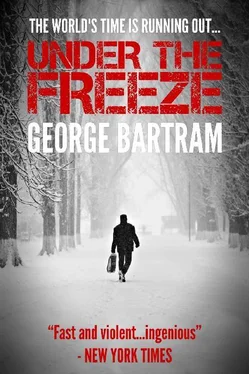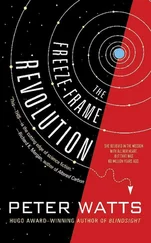“With thanks and a gold watch.”
“Is that an American joke?”
“It has to do with what happens when people retire.”
“Ah. Everyone gets a gold watch?”
“No, only people who don’t need them.”
“Soviet workers would be delighted with a gold watch.”
“I think the sense of humor is different here.”
Strisz looked troubled. “You think we lack a sense of humor?”
“What’s going to happen to me? Forget humor. What’s going to happen to me?”
“The general-secretary has decided that you will be detained until the Beranyi business is solved.”
Until it’s solved … Meaning , until knowledge falls into their laps . That could be months . Years . “What’s your role?” Tarp said, trying to make it casual.
“Me? Oh.” Strisz looked a little embarrassed. “Oh, I’m a friend of the court, as they say in Western law.”
“Well, better you than Telyegin.”
“But Telyegin is fair. When he’s well, I mean. For that matter, we’re all fair.”
Tarp looked at him. “Is that one of your jokes?”
“Certainly not. Certainly not!”
Tarp smiled. He was left unsure as to just where Strisz stood; no doubt it had been the intention to leave him that way. He was silent and began to think of his situation. There would be pressure now to wind the Maxudov thing up. And that could be good for me . Tarp wondered about the possibilities of escaping from the Soviet Union. Not good . I might do something through the French if I could find one of Laforet’s people , but my chances would be slim . There’s the Gogol’s statue drop . “Is anybody interested in what really happened to me during those days?” he said.
“Oh, definitely. But, ah, it is not my mission to ask such questions.”
“Whose? Telyegin’s? Falomin’s? Mensenyi’s, because of understanding of the foreign mind?”
“Two of Falomin’s people are outside.”
“Oh, I see. You’re the warm-up act. Is that it?”
“What is ‘warm-up act’?”
“I suppose everything we’ve said is on tape.”
“There has been normal surveillance.”
“I hope they get the joke about the gold watch.”
* * *
For the next two days two teams of interrogators alternated in asking him the same sets of questions. The clinic seemed divided between keeping him alert enough to answer questions and sedated enough to get the sleep he needed. Still, they took the IV away the day after he woke up, and the day after that he was walking down the corridor in order to meet his interrogators there. They tried to be objective, but their questions were tinged with an incredulity that suggested they had been primed to taunt him.
“And you insist that Comrade Beranyi himself questioned, you?” one of them asked for the fifth time.
“Yes.”
“While you were sick and injured ?” The man sounded shocked, even though he had been through it all before.
“Yes.”
“How could you be sure it was Comrade Beranyi?”
“I had his file. There were seven photos of him in it. I had his physical description.”
“But he did not introduce himself as Beranyi!”
“He used that name.”
“Are you sure?”
Tarp tried to be honest. “I think he did.”
“Aha! You see?”
It was pleasant in the sunroom. The Moscow sun actually shone into it, making it a warm and drowsy place. Even the repetition of the questions seemed soothing, like an old story retold by a fire.
“Have you considered,” one of the investigators said, “that your story sounds like an enormous hoax?”
“Hoax?” Tarp, who had been reclining in the sun with his eyes closed, opened one eye to look.
“Suppose your story were true, but suppose these were impersonators pretending to be Comrade Beranyi and these others. Suppose the place was not the Lubyanka at all.”
“Like a play,” Tarp said.
“Exactly!”
“You’re right. It was actually the stage of the Maly Theatre.”
He closed his eyes. He heard a sharp inhalation, perhaps a gesture of disgust. The man was young, seemingly eager; it was a sign of what was happening in the investigation that the ones he dealt with now were lower bureaucrats. Somebody had decided that the way to whitewash the Maxudov affair was to make it routine. It would be allowed to sink into the bottomless mush of bureaucracy.
Strisz came back. The same somebody who was turning it to routine seemed also to have decided that Strisz was to be the “good guy” of Tarp’s world, the one who comforted and who listened sympathetically. It was not a role that could do Strisz himself much good, Tarp thought.
“They think they’ve found your Mongol guard,” Strisz told him. “In Balakhna.”
“Dead?”
“No, no. Quite alive. He’s in the Jewish program out there. They’re going to bring him to Moscow for questioning.”
“A little strange that he’s alive.”
“Well, this isn’t America, you know. We aren’t gangsters. Still, yes, it’s all very audacious. As if Beranyi believed we wouldn’t really care.”
As if , in fact , he weren’t Maxudov . As if he questioned me because he didn’t trust me and he thought they’d understand . Or as if he questioned me to get in ahead of me and take all the credit for himself . He did not say so, however. He wanted to get out of the Soviet Union.
They brought the Mongol to the clinic that evening. Tarp was sitting up, wearing trousers and a sweater. Two men from Special Investigations brought the man into his room.
“Is this one of the men who, you submit, assaulted you?”
Tarp looked the man over. He remained impassive, even insolent. “Yes,” Tarp said.
“Are you sure?”
“Have him say something.”
One of them nudged the Mongol. “Speak.”
“What am I to say?”
Tarp ran his tongue over his injured gum. “Say, ‘The fucker ducked.’”
“The fucker ducked.”
“Louder.”
“ The fucker ducked !”
“That’s the man.”
The next morning Strisz brought him more clothes and a rather greasy bag of sweet poppy-seed rolls. It turned out that Strisz liked the rolls himself.
“Don’t you have work to do?” Tarp said. He felt on good terms with Strisz, even good enough to make personal jokes. “I’m doing my work.”
“Was that the general secretary’s decision?”
Strisz hesitated. “There was a meeting. We made some decisions.”
“Who? You and the secretary?”
“No, no — at Dzerzhinsky Square. Those of who were, um, closest to this.” The suspects, he meant. The foxes who had been given charge of the henhouse.
“Was the secretary there?”
“He sent a deputy.”
“Telyegin? Was Telyegin there?”
“Telyegin is very ill. He went into the hospital last night.”
Tarp was dressing. “These clothes almost fit. Russian factories are getting better. Why am I dressing?”
“You’re being moved.”
“Where?” Tarp thought of the Lubyanka, not without a tremor of fear.
“An apartment.”
“You’re treating me very well, I must say. Almost as well as if I were a defector.”
“Frankly, the general opinion is that Beranyi was it. There’s some feeling that you can be sent home. The general secretary wants to, um, send a signal to Washington that we can put our own house in order and stand by our commitments.”
Читать дальше












